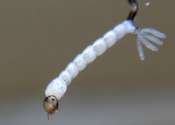Innovative chemical strategy targets mosquito larvae gut to combat spread of deadly diseases
Mosquito-borne illnesses remain a formidable challenge threatening millions of people each year with diseases such as malaria, dengue, zika and chikungunya.

Mosquito-borne illnesses remain a formidable challenge threatening millions of people each year with diseases such as malaria, dengue, zika and chikungunya.
Biochemistry
Mar 18, 2024
0
5

When organisms pass their genes on to future generations, they include more than the code spelled out in DNA. Some also pass along chemical markers that instruct cells how to use that code. The passage of these markers to ...
Plants & Animals
Aug 28, 2023
0
13

Scientists have developed a revolutionary way to determine if animals are being illegally trafficked.
Plants & Animals
Oct 24, 2018
0
137

Of the 37 trillion cells in the typical human body, the ability to distinguish one type of cell from another isn't as straightforward as you may think.
Biotechnology
Apr 9, 2018
0
25

Fish species that are both economically and ecologically important in South America live mysterious lives.
Ecology
Jun 7, 2016
0
449

Everyone knows all about the epic breeding journey taken each year by generations of monarch butterflies between Mexico and Canada, right? Not so fast, say researchers including University of Guelph biologists.
Plants & Animals
Aug 7, 2013
1
0

Long before plants and animals inhabited the earth, when life consisted of single-celled organisms afloat in a planet-wide sea, bacteria invaded these organisms and took up permanent residence. One bacterium eventually became ...
Cell & Microbiology
Jun 19, 2013
0
0

Scientists at the Salk Institute for Biological Studies have identified patterns of epigenomic diversity that not only allow plants to adapt to various environments, but could also benefit crop production and the study of ...
Biotechnology
Mar 6, 2013
0
0

(Phys.org) —A Canadian research team, helped by scientists at The University of Manchester, has discovered the first evidence of an extinct giant camel in the High Arctic. The three-and-a-half million year old fossil was ...
Archaeology
Mar 5, 2013
5
1

(Phys.org)—Peter Willis and his team of researchers at NASA's Jet Propulsion Laboratory in Pasadena, Calif., had a problem. Actually, more like they had a solution that needed a problem. Confused? Let's let Peter give it ...
Space Exploration
Oct 12, 2012
0
0